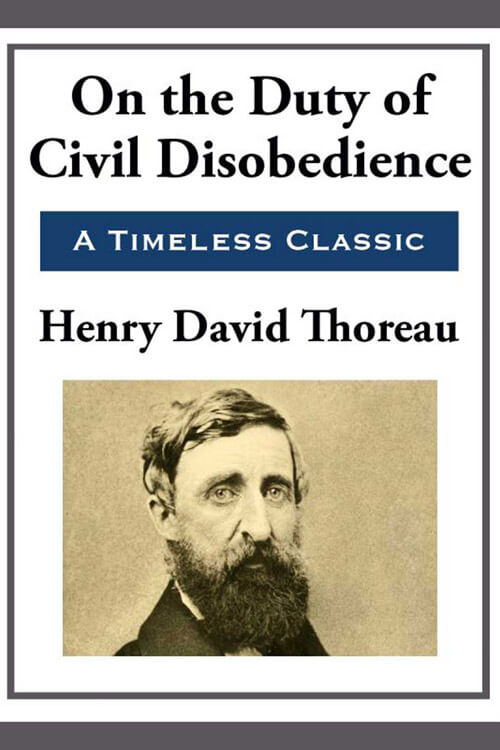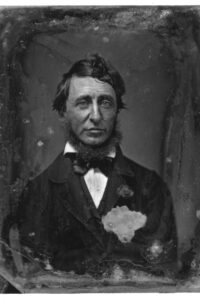
Walden and On the Duty of Civil Disobedience
Thoreau asserts that because governments are typically more harmful than helpful, they cannot be justified. Democracy is no cure for this, as majorities, simply by being majorities, do not also gain the virtues of wisdom and justice. The judgment of an individual’s conscience is not necessarily inferior to the decisions of a political body or majority, and so “[i]t is not desirable to cultivate a respect for the law, so much as for the right. The only obligation I have a right to assume is to do what I think is right at any time…. Law never made men a whit more just; and, using their respect for it, even the well-disposed are daily made the agents of injustice.” He adds, “I cannot for an instant recognize as my government [that] which is the slave’s government also.”
According to Thoreau, the government is not just a little corrupt or unjust in the course of doing its otherwise important work. Still, the government is primarily an agent of corruption and injustice. Because of this, it is “not too soon for honest men to rebel and revolutionize”. Political philosophers have counselled caution about the revolution because the upheaval typically causes a lot of expense and suffering. Thoreau contends that such a cost/benefit analysis is inappropriate when the government is actively facilitating an injustice as extreme as slavery. Such a fundamental immorality justifies any difficulty or expense to bring it to an end. “This people must cease to hold slaves, and to make war on Mexico, though it cost them their existence as a people.” Thoreau tells his audience that they cannot blame this problem solely on pro-slavery Southern politicians but must put the blame on those in, for instance, Massachusetts, “who are more interested in commerce and agriculture than they are in humanity and are not prepared to do justice to the slave and Mexico, cost what it may…
Thousands are in opinion opposed to slavery and to the war, who yet in effect do nothing to put an end to them.”He encourages people not to wait passively for an opportunity to vote for justice because voting for justice is as ineffective as wishing for justice; what you need to do is be just. This is not to say that you must devote your life to fighting for justice, but you have an obligation not to commit injustice and not to give injustice your practical support.
Read or download Book
Henry David Thoreau
Henry David Thoreau (July 12, 1817 – May 6, 1862) was an American naturalist, essayist, poet, and philosopher.
Biography
A leading transcendentalist, he is best known for his book Walden, a reflection upon simple living in natural surroundings, and his essay “Civil Disobedience” (originally published as “Resistance to Civil Government”), an argument in favour of peaceful disobedience against an unjust state. Thoreau’s books, articles, essays, journals, and poetry amount to over 20 volumes. Among his lasting contributions are his writings on natural history and philosophy, in which he anticipated the methods and findings of ecology and environmental history, two sources of modern-day environmentalism. His literary style interweaves close observation of nature, personal experience, pointed rhetoric, symbolic meanings, and historical lore while displaying a poetic sensibility, philosophical austerity, and attention to practical detail. He was also profoundly interested in survival in the face of hostile elements, historical change, and natural decay; simultaneously, he advocated abandoning waste and illusion to discover life’s essential needs. Thoreau was a lifelong abolitionist, delivering lectures that attacked the fugitive slave law while praising the writings of Wendell Phillips and defending the abolitionist John Brown.
Thoreau’s philosophy of civil disobedience later influenced the political thoughts and actions of notable figures such as Leo Tolstoy, Mahatma Gandhi, and Martin Luther King Jr. Thoreau is sometimes referred to as an anarchist. In “Civil Disobedience”, Thoreau wrote: “I heartily accept the motto,—’That government is best which governs least,’ and I should like to see it acted up to more rapidly and systematically. Carried out, it finally amounts to this, which also I believe,—’That government is best which governs not at all;’ and when men are prepared for it, that will be the kind of government which they will have. … But, to speak practically and as a citizen, unlike those who call themselves no-government men, I ask for, not at once no government, but at once a better government.”






